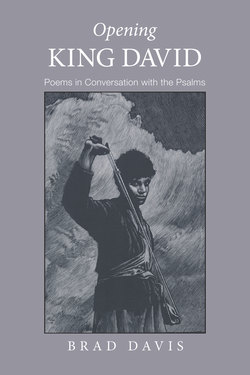Читать книгу Opening King David - Brad Davis - Страница 5
На сайте Литреса книга снята с продажи.
Preface
ОглавлениеThe writing of these poems began on the first Sunday in Advent 2002. Over the next six years, they were drafted (sequentially through 2005) and then revised. The plan was to make a slow, contemplative read (lectio divina) through the Bible’s book of Psalms, one psalm a week, and by each week’s end to draft a poem in loose conversation with the biblical text. The intention was not to create a new translation/adaptation of the Psalms, engage in midrash, or even generate “religious” verse, but to make poems in a conversational idiom that bear witness to an attention to three horizons: the text, my surroundings (natural, cultural, relational, situational), and whatever may have been happening inside my skin at the time of composition. The sequence is an extended ekphrasis, writing that reflects upon and calls attention to another art form, in this case the 150 liturgical song lyrics of the biblical Psalter.
Other than to utilize a generally hospitable idiom (one of the rhetorical strategies in the Psalms), I set for myself no formal parameters though early on enjoyed working with a decasyllabic line and toward a sonnet-like fourteen-line form (in Book One especially) to which I returned here and there throughout the drafting process. Rhyme and regular rhythm happen now and then, but these are more happy accidents I decided to keep than anything else. Likewise, there are lines in which I have chosen to retain words or phrases some may find offensive. As an artist, I paint with the colors available to me, compose with the full range of notes on the scale. That said, if any poem with a “bad word” is also a bad poem, that is another matter altogether.
If there is a reader to whom my heart inclined throughout the drafting and revising of these poems it is anyone whose relationship with “religion” is strained or broken and who is familiar with struggle and the hope for something more or better or more real. I am a believer. This does not make struggle or sickness or layoffs or dying go away. At the best moments, I’ve a lively sense of God’s sustaining love for all things and me right there in the mix; at other moments, there is silence, fear, a sense of vast distances, absence, and I cling to faithful words and sacramental acts that speak blindly of what may lie beyond their otherwise empty occurrences. Early in the composition of this sequence, I drafted a line that captured my sense of purpose for the project as a whole: “Every word, a stand against losing heart.” I still believe it.
A final paragraph about the volume you hold: it is divided into five sections or “books” following the traditional five-book division of the biblical Psalter. The one-hundred fifty poems in Opening King David are in conversation sequentially with the Bible’s one-hundred fifty psalms. As a navigational help, there is, atop the first page of each poem, a quotation or triggering verse from its corresponding psalm.
